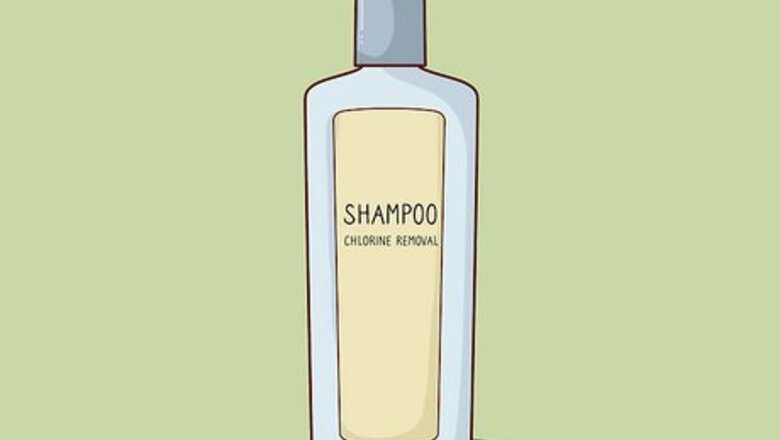
views
Removing Chlorine with Swim Products
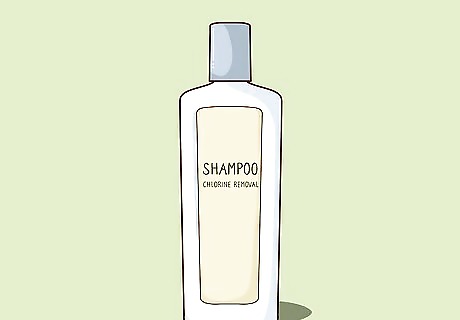
Shampoo your hair with a swim shampoo. Swim shampoos, or chlorine removal shampoos, are formulated specifically to help remove chlorine and any resulting green tint. Wash your hair thoroughly with a swim shampoo as soon as possible after you get out of the pool. Be sure to work the shampoo into a lather and let it sit for a minute before rinsing it completely. If you have color-treated hair, you can always substitute a swim shampoo for a color-safe clarifying shampoo. These shampoos are available at most pharmacies, beauty and haircare stores, and online retailers. Using a conditioner after shampoo will help you work out any tangles and keep your hair smooth.
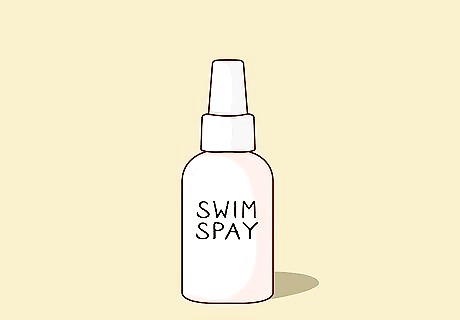
Spritz on a chlorine-removal spray instead of buying new shampoo. Some athletics stores and swim stores sell chlorine removal sprays. These are used in the shower after you rinse your hair, but before you shampoo. Hold the bottle about half an arm’s length from your head, and mist all your hair with the spray. Then, use your regular shampoo to rinse the spray away. These sprays work by neutralizing the chlorine in your hair to prevent damage and irritation. Most chlorine-removal sprays are formulated to work on both hair and skin, so you can use it to remove chlorine irritation and smell on your skin, too.
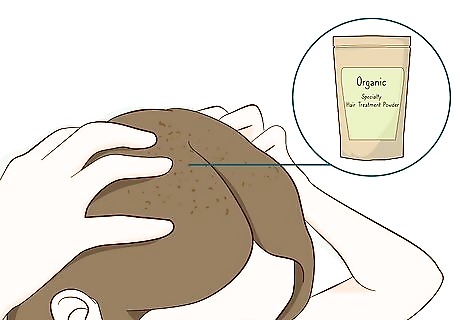
Try a specialty treatment if you regularly expose your hair to chlorine. Some companies that make swim shampoos also make specialty treatments. These often come as packets of a powder-like treatment that you massage into your hair in the shower. Allow it to sit for 2-3 minutes before washing it out. These treatments can be used instead of or in addition to other chlorine-removal products.
Treating Your Hair at Home
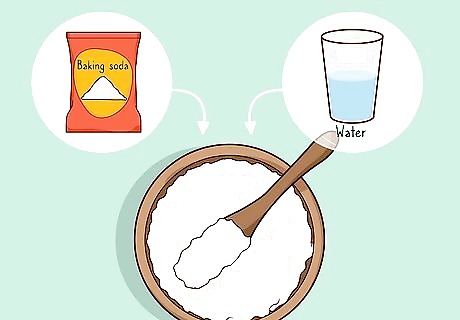
Make a paste using baking soda. Mix a ¼ cup (32 g) to ½ cup (64 g) of baking soda with enough water to form a runny paste. Apply the paste to damp hair and massage it from your scalp to your ends. Then, rinse out the paste using clean water and shampoo. The baking soda will help neutralize the chlorine and lift out any green color the chlorine deposited. Your hair will feel dry after using baking soda, so follow up with a moisturizing conditioner. If you have very light hair, you may have to repeat this process a few times to fully lift any residual green color.
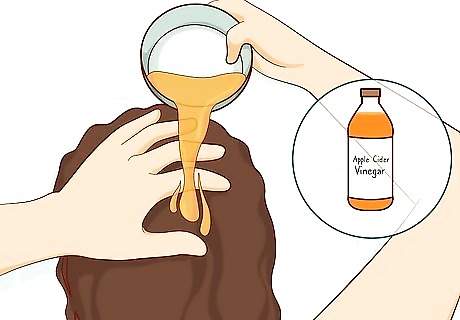
Wash your hair with apple cider vinegar. Apple cider vinegar can work like a clarifying shampoo after you swim. Simply pour about a ¼ cup (about 60 ml) of apple cider vinegar over your head while showering. Use your fingers to work it from your scalp to your tips. Then, rinse the vinegar away with clean, warm water. There is no need to shampoo after using vinegar. If the smell of the vinegar lingers, follow up by using conditioner to get rid of the odor if it bothers you. Apple cider vinegar can be stripping, so it’s not generally advisable to use this treatment intermittently. If you swim regularly, it may be worth investing in a chlorine-removal product.
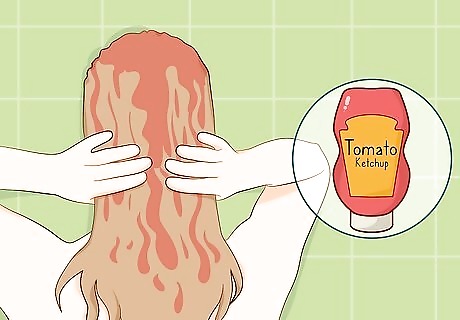
Try tomato product like tomato paste, ketchup, or tomato juice. Apply a thin layer of your tomato product to damp hair, working from the scalp to the ends. Allow it to sit for 10-15 minutes before rinsing your hair thoroughly in the shower. Once the water rinses clear, shampoo your hair and follow up with your regular hair care routine. Use a wide-toothed comb to help evenly distribute the product through your hair. The red color of tomato products is thought to be particularly helpful for neutralizing the green coloring chlorine can leave behind on lighter hair.
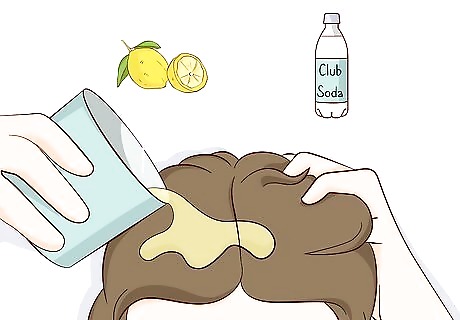
Add lemon juice to club soda to create a citrus rinse. In a small bowl, mix the juice from one lemon with a splash of club soda.Pour this over damp or dry hair, and comb through with a wide-toothed comb to evenly distribute the product. Let the mixture sit for 3-5 minutes, then rinse your hair thoroughly in the shower. Follow the rinse with your regular shampoo. You can also add the treatment to a spray bottle and spray it over your hair. Do not try this treatment if you have a dry, cracked, irritated, or flaky scalp.
Preventing Future Chlorine Buildup

Wear a swim cap. If you plan to swim a lot, a good swim cap is a worthwhile investment. Look for a silicone swim cap that is lightweight, breathable, and comfortable on your head. A good cap shouldn’t snag your hair or cause headaches from wear. To get the most from your cap, be sure that all your hair is tucked underneath it before you enter the pool.
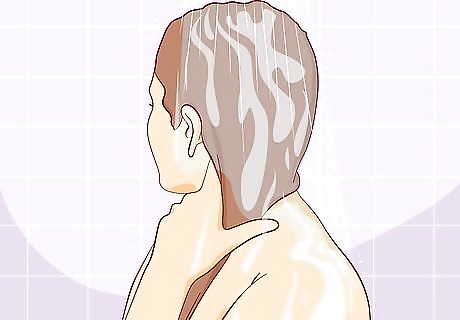
Soak your hair with clean water. Before you get in the pool, wet your hair completely with clean water from the shower. This may minimize the amount of chlorinated water your hair is able to absorb once you get in the pool. Many pools have showers in the locker rooms or outside near the swimming area that you can use before and after you swim.
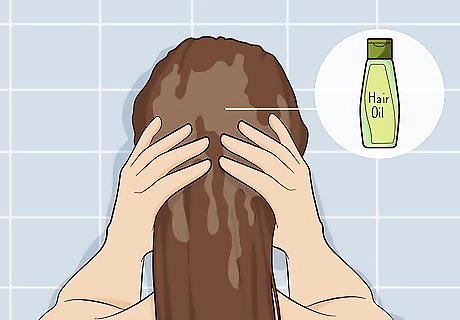
Coat your hair with an oil before you swim. Since oil is hydrophobic (water-fearing), it will help repel chlorinated water from your hair. Liberally apply a hair oil from scalp to tip before you swim. To get the most out of the oil, use it under a swim cap. If you don’t have a hair oil, you can use olive oil, coconut oil, avocado oil, or jojoba oil.
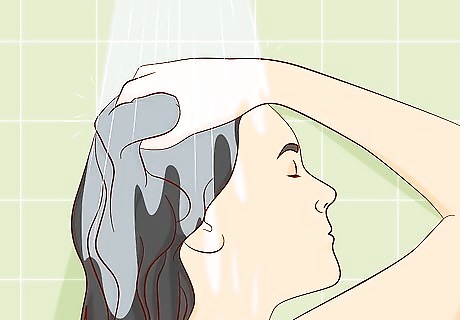
Rinse your hair immediately after swimming. Even if you don’t take a full shower in the locker room after swimming, at least rinse your hair. This will kickstart the process of removing chlorine and help prevent the long-term buildup of pool chemicals in your hair.

















Comments
0 comment